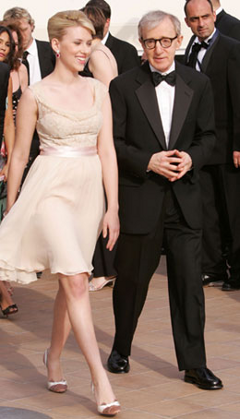
There is a startlingly unanimous specificity to the reception of master filmmaker Woody Allen's most recent picture, the thriller Match Point. Virtually every review asserts that the new film marks a return to the auteur's past glory and that the world's most famous Manhattanite has paradoxically ended his exile by leaving home and producing a London-based masterpiece.
The party line is hard to buy on two scores.
First, the derivative mediocrity of Match Point seems an odd platform from which to launch the triumphant comeback tour.
Second, Allen never actually fell to the depths that most insist he is only now coming back from; instead, a very short, spotty period in a decades-long career was parlayed into a total collapse by wishful thinkers looking for payback for Allen's detestable personal life decisions. To paraphrase an American humorist of comparable renown to Allen, news of his death - and resurrection - have been highly exaggerated.
Peter Biskind's celebrated book on the New Hollywood, Easy Riders, Raging Bulls, makes clear that of the post-studio era filmmakers, only the drug-free, hyper-prolific Allen had the mettle to match the ego-driven ambitions of the auteur cinema over the long term. As many of his contemporaries burnt out, Allen pushed ahead with an oeuvre that was baffling in terms both of its enormity as well as its consistent excellence.
While most of their peers were swallowed whole by the vortex of Los Angeles, Allen and Martin Scorcese in New York (and, to an extent, Francis Ford Coppola in Northern California) managed to resist the commercial trappings that decimated the new cinema after Spielberg's Jaws. As talents like Peter Bogdanovich stooped to directing Cher in Mask, Allen achieved new levels of brilliance in drama such as Hannah and her Sisters (1986) and Husbands and Wives (1992), whimsy such as The Purple Rose of Cairo (1985), memoirs such as Radio Days (1987) and comedy such as Manhattan Murder Mystery (1993) and the celebrated Bullets over Broadway (1994).
But it was around this time that revelations of Allen's quasi-incestuous, quasi-paedophilic proclivities - coupled with his unreconstructed misogyny - made him a liability, and made any defense of his work an embarrassment at the best of times, and an impolitic apologia for the grossest excesses of bad male behaviour at the worst. It seems that only now, with the unanimous approval being heaped on Match Point, has the stigma associated with loving his films (and not the man) been erased.
The problem is, even during this supposedly dark and lackluster period, Allen made two great films (1997's Deconstructing Harry and 1999's Sweet and Lowdown) and two fairly good ones (1998's Celebrity and 2000's Small Time Crooks). So what are we left with as evidence of the director's much-vaunted rut? One unwatchable picture (2002's catastrophic Hollywood Ending) and three crummy ones (2001's Curse of the Jade Scorpion, 2003's Anything Else and 2004's Melinda and Melinda). Is this surprising or unforgivable, coming from a man who makes a movie a year?
What's even odder is the identification of Match Point as Allen's salvation. Here is a picture beset by all of his recent problems: wooden, expository dialogue obviously written by a screenwriter removed by generations from the actors who speak it; themes and plot derivative of earlier films; bafflingly terrible acting. Where's the comeback here? How can a director be rewarded for making a worse version of a film that he's already made brilliantly, in this case Crimes and Misdemeanors (1989)?
Particularly troubling is Allen's total inability to draw consistently meaningful, expert performances from his actors. His dialogue problems can be solved simply by his writing scripts about people closer to his own age (though Allen's well-known immaturity makes this far less likely). But ever since the director allowed for the abysmal performances of Dan Aykroyd and Elizabeth Berkley to make the final cut of Curse of the Jade Scorpion, he's paid a woeful lack of attention to his actors. Melinda and Melinda had a rehearsal feel so pathetic that one friend of mine thought it may have been a device used to advance the film's drama versus comedy 'script' conceit. The lead actors in Match Point, Jonathan Rhys-Meyers and particularly Scarlett Johansson, are awful, though the supporting performances - especially those of Brian Cox and Emily Mortimer - are admittedly superb.
What seems clear is that the celebratory homecoming for Woody is less about Match Point being a departure, and more about lifting the moral embargo initiated after the revelations about Allen's character - just as the overstatement of his slump had more to do with revulsion at his antics than his actual output.
Why this is happening now could be for any number of reasons. Maybe Soon-Yi Previn's senescence and the seeming stability of their romantic relationship (whose banality and relative toothlessness was made clear during the Spanish Omelette scene in the documentary Wild Man Blues) has taken the edge off of the initial creepiness; maybe Mia Farrow's defense of the paedophile-rapist Roman Polanski undermined her moral case against Allen; maybe in the era of Jesus Juice at the Neverland Ranch, our standards for outrage have been raised above anything Allen can muster. Most likely, mass indignation was simply too difficult to maintain for too long a period of time - especially when it meant shunning one of the world's most excellent living directors.
All this means that Allen's films can now be dealt with and criticized more honestly, on their own terms, separately from his revolting personal life. That's a victory for filmmaking, even if it marks a certain dilemma of moral ambiguity (see Polanski's rebirth as a documenter of the Holocaust). But as Allen himself outlined in Crimes and Misdemeanors - an argument reheated in the cinematic leftover Match Point - we live in a world that feels the effects of good fortune far more than those of justice. And in his case, fortune happens to be buttressed with perhaps the greatest resources of talent and intelligence that have ever been at the disposal of an American filmmaker. Justice never stood a chance.
Charles Demers is an editor of Vancouver-based Seven Oaks Magazine, where this article first appeared. ![]()















Tyee Commenting Guidelines
Comments that violate guidelines risk being deleted, and violations may result in a temporary or permanent user ban. Maintain the spirit of good conversation to stay in the discussion.
*Please note The Tyee is not a forum for spreading misinformation about COVID-19, denying its existence or minimizing its risk to public health.
Do:
Do not: